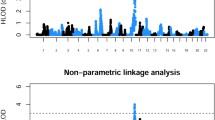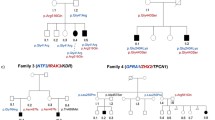Abstract.
Our objective in this study was to determine whether mutations in the gene for the 5-hydroxytryptamine receptor 2A (HTR2A) cause the autosomal dominant form of severe pediatric gastroesophageal reflux (GER), which we had previously mapped to a 21-cM region at chromosome 13q14. Direct sequencing of the HTR2A gene was carried out on DNA from affected and unaffected members of families with severe pediatric GER displaying genetic linkage to the HTR2A locus. In addition, we performed high-resolution linkage mapping within the GER gene region using additional polymorphic markers closely linked to HTR2A. Several previously reported polymorphisms in the HTR2A gene were identified in three families affected with GER. In addition, we identified a novel polymorphism at nucleotide –1273 in the HTR2A promoter. No mutant allele cosegregated exclusively with the GER phenotype in any family. Linkage analysis using additional polymorphic markers narrowed the region of the GER gene to a 9 cM interval between markers D13S263 and CAGR1, formally excluding HTR2A as a candidate gene. In conclusion, sequence analysis of HTR2A and linkage analysis argue against mutations in HTR2A being a cause of severe pediatric GER.
Similar content being viewed by others
Author information
Authors and Affiliations
Additional information
Electronic Publication
Rights and permissions
About this article
Cite this article
Hu, F., Post, J., Johnson, S. et al. Refined localization of a gene for pediatric gastroesophageal reflux makes HTR2A an unlikely candidate gene. Hum Genet 107, 519–525 (2000). https://doi.org/10.1007/s004390000405
Received:
Accepted:
Issue Date:
DOI: https://doi.org/10.1007/s004390000405




